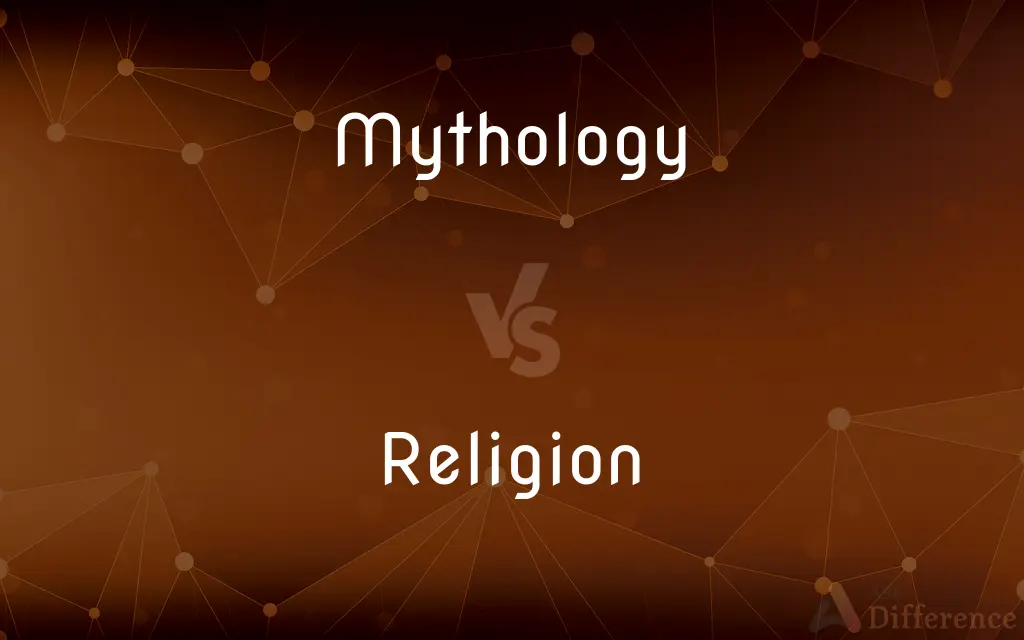Mythology vs. Religion — What's the Difference?
By Tayyaba Rehman — Updated on September 25, 2023
Mythology is a collection of myths or traditional stories, especially ones concerning the early history of a people or explaining a natural phenomenon. Religion is a structured system of faith or worship, often involving belief in a higher power.

Difference Between Mythology and Religion
Table of Contents
ADVERTISEMENT
Key Differences
Mythology is primarily a collection of myths, stories, or legends, especially ones belonging to a particular religious or cultural tradition. It is a form of cultural storytelling that often explains natural phenomena, traditions, and values and may involve gods, heroes, and supernatural beings. Mythology does not necessarily prescribe moral principles or ways of life but rather seeks to explain the world and human experience through stories.
Religion, on the other hand, is a structured system of beliefs, values, rituals, and worship centered around a higher power or powers, which can include gods, spirits, or other divine entities. It often provides moral, ethical, and existential guidelines, instructing adherents on how to live, act, and understand their place in the world. Religion usually encompasses a formalized and organized set of beliefs and practices and is often institutionalized, with specific doctrines, rituals, and clerical hierarchies.
Mythology often forms part of the broader narrative and symbolic framework within a religion, serving to convey moral lessons, cultural history, and values through stories. It functions as a means to impart wisdom, explain the unknown, and provide a sense of tradition and cultural identity. Mythologies are often colorful, vibrant, and rich in symbolism, serving as a mirror to the beliefs, fears, and hopes of societies.
Religion usually has a more profound impact on individuals' lives, shaping their beliefs, behaviors, and identities. It often involves worship, rituals, and adherence to certain moral and ethical codes. Religions often have established places of worship, regular congregations, and clerical authorities who guide the spiritual and moral life of the community.
In summary, while mythology is focused on stories, symbols, and traditions, conveying cultural and moral values, religion is a structured and organized system of beliefs and practices, providing moral, existential, and ethical guidelines, often involving the worship of a higher power or powers.
ADVERTISEMENT
Comparison Chart
Definition
Collection of myths, stories, or legends.
Structured system of beliefs, values, and practices.
Focus
Explains natural phenomena, traditions, and values through stories.
Provides moral, ethical, and existential guidelines and involves worship.
Nature
Story-centric, symbolic, explanatory.
Doctrine-centric, prescriptive, normative.
Presence of Deities
Often involves gods, heroes, and supernatural beings.
Typically involves higher power or powers, gods, spirits, or divine entities.
Application
Serves to impart wisdom and provide a sense of tradition and identity.
Shapes individuals' beliefs, behaviors, and identities and has established rituals and places of worship.
Compare with Definitions
Mythology
A body of myths associated with a particular subject or person.
The mythology of a famous celebrity often includes both real and exaggerated events.
Religion
An organized collection of beliefs, cultural systems, and world views that relate humanity to an order of existence.
Hinduism is one of the oldest religions in the world.
Mythology
A set of stories, traditions, or beliefs associated with a particular group or the history of an event.
The mythology surrounding the founding of Rome includes the story of Romulus and Remus.
Religion
The service and worship of God or the supernatural.
The freedom of religion is a fundamental human right.
Mythology
A widely held but false belief or idea.
The belief in the “self-made man” is often considered a modern mythology.
Religion
A particular system of faith and worship.
Islam is a religion that teaches the oneness of God.
Mythology
A collection of myths or traditional stories of a particular culture or society.
Greek mythology is rich with tales of gods, monsters, and heroes.
Religion
A pursuit or interest followed with great devotion.
For some, fitness has become a religion.
Mythology
The study of myths.
Through the study of mythology, we can gain insights into the beliefs and values of ancient cultures.
Religion
Religion is a social-cultural system of designated behaviors and practices, morals, beliefs, worldviews, texts, sanctified places, prophecies, ethics, or organizations, that relates humanity to supernatural, transcendental, and spiritual elements; however, there is no scholarly consensus over what precisely constitutes a religion.Different religions may or may not contain various elements ranging from the divine, sacred things, faith, a supernatural being or supernatural beings or "some sort of ultimacy and transcendence that will provide norms and power for the rest of life". Religious practices may include rituals, sermons, commemoration or veneration (of deities and/or saints), sacrifices, festivals, feasts, trances, initiations, funerary services, matrimonial services, meditation, prayer, music, art, dance, public service, or other aspects of human culture.
Mythology
A body or collection of myths belonging to a people and addressing their origin, history, deities, ancestors, and heroes.
Religion
The belief in and reverence for a supernatural power or powers, regarded as creating and governing the universe
Respect for religion.
Mythology
A body of myths associated with an event, individual, or institution
"A new mythology, essential to the ... American funeral rite, has grown up" (Jessica Mitford).
Religion
A particular variety of such belief, especially when organized into a system of doctrine and practice
The world's many religions.
Mythology
The field of scholarship dealing with the systematic collection and study of myths.
Religion
A set of beliefs, values, and practices based on the teachings of a spiritual leader.
Mythology
The collection of myths of a people, concerning the origin of the people, history, deities, ancestors and heroes.
Religion
The life or condition of a person in a religious order
A widow who went into religion and became a nun.
Mythology
A similar body of myths concerning an event, person or institution.
Religion
A cause, principle, or activity pursued with zeal or conscientious devotion
A person for whom art became a religion.
Mythology
Pervasive elements of a fictional universe that resemble a mythological universe.
Religion
(uncountable) Belief in a spiritual or metaphysical reality (often including at least one deity), accompanied by practices or rituals pertaining to the belief.
My brother tends to value religion, but my sister not as much.
Mythology
(uncountable) The systematic collection and study of myths.
Religion
(countable) A particular system of such belief, and the rituals and practices proper to it.
Belief system
Islam is a major religion, particularly in North Africa and Southwest Asia.
Mormonism is a new religion, while Zoroastrianism is an old one.
Mythology
The science which treats of myths; a treatise on myths.
Religion
(uncountable) The way of life committed to by monks and nuns.
The monk entered religion when he was 20 years of age.
Mythology
A body of myths; esp., the collective myths which describe the gods of a heathen people; as, the mythology of the Greeks.
Religion
Rituals and actions associated with religious beliefs, but considered apart from them.
I think some Christians would love Jesus more if they weren't so stuck in religion.
Jack's spiritual, but he's not really into religion.
Mythology
Myths collectively; the body of stories associated with a culture or institution or person
Religion
(countable) Any practice to which someone or some group is seriously devoted.
At this point, Star Trek has really become a religion.
Mythology
The study of myths
Religion
Faithfulness to a given principle; conscientiousness.
Religion
Engage in religious practice.
Religion
Indoctrinate into a specific religion.
Religion
To make sacred or symbolic; sanctify.
Religion
The outward act or form by which men indicate their recognition of the existence of a god or of gods having power over their destiny, to whom obedience, service, and honor are due; the feeling or expression of human love, fear, or awe of some superhuman and overruling power, whether by profession of belief, by observance of rites and ceremonies, or by the conduct of life; a system of faith and worship; a manifestation of piety; as, ethical religions; monotheistic religions; natural religion; revealed religion; the religion of the Jews; the religion of idol worshipers.
An orderly life so far as others are able to observe us is now and then produced by prudential motives or by dint of habit; but without seriousness there can be no religious principle at the bottom, no course of conduct from religious motives; in a word, there can be no religion.
Religion [was] not, as too often now, used as equivalent for godliness; but . . . it expressed the outer form and embodiment which the inward spirit of a true or a false devotion assumed.
Religions, by which are meant the modes of divine worship proper to different tribes, nations, or communities, and based on the belief held in common by the members of them severally. . . . There is no living religion without something like a doctrine. On the other hand, a doctrine, however elaborate, does not constitute a religion.
Religion . . . means the conscious relation between man and God, and the expression of that relation in human conduct.
After the most straitest sect of our religion I lived a Pharisee.
The image of a brute, adornedWith gay religions full of pomp and gold.
Religion
Specifically, conformity in faith and life to the precepts inculcated in the Bible, respecting the conduct of life and duty toward God and man; the Christian faith and practice.
Let us with caution indulge the supposition that morality can be maintained without religion.
Religion will attend you . . . as a pleasant and useful companion in every proper place, and every temperate occupation of life.
Religion
A monastic or religious order subject to a regulated mode of life; the religious state; as, to enter religion.
A good man was there of religion.
Religion
Strictness of fidelity in conforming to any practice, as if it were an enjoined rule of conduct.
Those parts of pleading which in ancient times might perhaps be material, but at this time are become only mere styles and forms, are still continued with much religion.
Religion
A strong belief in a supernatural power or powers that control human destiny;
He lost his faith but not his morality
Religion
Institution to express belief in a divine power;
He was raised in the Baptist religion
A member of his own faith contradicted him
Religion
The belief in and worship of a superhuman controlling power, especially a personal God or gods.
Christianity is a religion based on the teachings of Jesus Christ.
Common Curiosities
Can mythology exist within religion?
Yes, mythology can form part of the broader narrative and symbolic framework within a religion, conveying moral lessons and cultural values.
Is religion always organized and institutionalized?
While many religions are organized and have institutional structures, some forms of spirituality and belief systems may lack such organization.
What does religion typically involve?
Religion typically involves a structured system of beliefs, values, rituals, and worship, often centered around a higher power or powers.
Can mythology be considered factual?
Mythology is generally not considered factual but is symbolic, representing truths, values, and beliefs of a culture or society.
Is mythology limited to ancient or traditional societies?
While often associated with ancient cultures, mythology can exist in any society, reflecting its beliefs, values, and traditions.
What is the main focus of mythology?
Mythology mainly focuses on a collection of myths or stories, often explaining natural phenomena, traditions, and values.
Can a set of moral and ethical values be considered a religion?
A set of moral and ethical values alone may not constitute a religion; typically, religion also involves elements of worship, rituals, and often a belief in the divine or supernatural.
How is mythology transmitted?
Mythology is often transmitted orally, through written texts, or through cultural practices and rituals.
Can myths change over time?
Yes, myths can evolve, reflecting changes in cultural values, beliefs, and societal norms.
Are religions universally accepted truths?
Religions are not universally accepted truths; they are belief systems that vary widely among different cultures and individuals.
How is religion different from spirituality?
Religion is often organized and institutional, involving specific doctrines and rituals, while spirituality may be more personal, individualized, and not confined to any specific doctrines or practices.
Can anyone create their own mythology?
While anyone can create stories or myths, a mythology typically involves a collection of myths that have cultural significance and are shared within a community.
Does every religion have a deity or god?
Not every religion posits the existence of a deity or god; some are non-theistic and focus on ethical, philosophical, or spiritual understandings of the world.
Can religion exist without mythology?
Yes, some religions may not have a rich tapestry of myths but may focus more on doctrines, ethics, and rituals.
Can a myth have elements of truth?
While myths are not factual accounts, they may contain elements of truth or reflect real events, people, or places, often embellished or symbolized over time.
Share Your Discovery

Previous Comparison
Gospel vs. Bible
Next Comparison
Harbour vs. PortAuthor Spotlight
Written by
Tayyaba RehmanTayyaba Rehman is a distinguished writer, currently serving as a primary contributor to askdifference.com. As a researcher in semantics and etymology, Tayyaba's passion for the complexity of languages and their distinctions has found a perfect home on the platform. Tayyaba delves into the intricacies of language, distinguishing between commonly confused words and phrases, thereby providing clarity for readers worldwide.













































